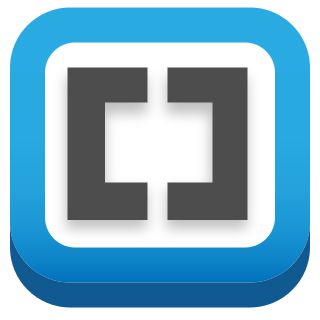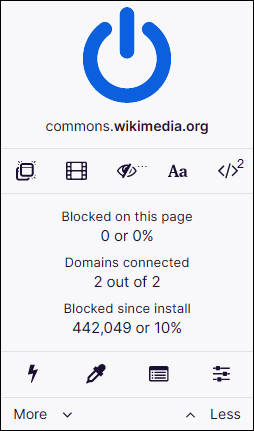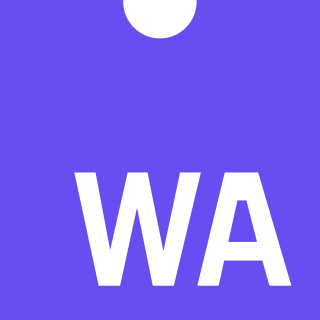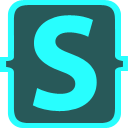Ad blocking or ad filtering is a software capability for blocking or altering online advertising in a web browser, an application or a network. This may be done using browser extensions or other methods.

Adblock Plus (ABP) is a free and open-source browser extension for content-filtering and ad blocking. It is developed by Eyeo GmbH, a German software company. The extension has been released for Mozilla Firefox, Google Chrome, Internet Explorer, Microsoft Edge, Opera, Safari, Yandex Browser, and Android.
NoScript is a free and open-source extension for Firefox- and Chromium-based web browsers, written and maintained by Giorgio Maone, an Italian software developer and member of the Mozilla Security Group.
A browser extension is a software module for customizing a web browser. Browsers typically allow users to install a variety of extensions, including user interface modifications, cookie management, ad blocking, and the custom scripting and styling of web pages.
Server Name Indication (SNI) is an extension to the Transport Layer Security (TLS) computer networking protocol by which a client indicates which hostname it is attempting to connect to at the start of the handshaking process. The extension allows a server to present one of multiple possible certificates on the same IP address and TCP port number and hence allows multiple secure (HTTPS) websites to be served by the same IP address without requiring all those sites to use the same certificate. It is the conceptual equivalent to HTTP/1.1 name-based virtual hosting, but for HTTPS. This also allows a proxy to forward client traffic to the right server during TLS/SSL handshake. The desired hostname is not encrypted in the original SNI extension, so an eavesdropper can see which site is being requested. The SNI extension was specified in 2003 in RFC 3546

Google Chrome is a cross-platform web browser developed by Google. It was first released in 2008 for Microsoft Windows, built with free software components from Apple WebKit and Mozilla Firefox. Versions were later released for Linux, macOS, iOS, and also for Android, where it is the default browser. The browser is also the main component of ChromeOS, where it serves as the platform for web applications.
NotScripts was a free and open-source extension for Google Chrome, Chromium, and Opera web browsers. NotScripts blocked execution of JavaScript, Java, Flash, Silverlight, and other plugins and scripted content. NotScripts used a whitelist to allow execution of scripts from certain sites.
Ghostery is a free and open-source privacy and security-related browser extension and mobile browser application. Since February 2017, it has been owned by the German company Cliqz International GmbH. The code was originally developed by David Cancel and associates.
Content Security Policy (CSP) is a computer security standard introduced to prevent cross-site scripting (XSS), clickjacking and other code injection attacks resulting from execution of malicious content in the trusted web page context. It is a Candidate Recommendation of the W3C working group on Web Application Security, widely supported by modern web browsers. CSP provides a standard method for website owners to declare approved origins of content that browsers should be allowed to load on that website—covered types are JavaScript, CSS, HTML frames, web workers, fonts, images, embeddable objects such as Java applets, ActiveX, audio and video files, and other HTML5 features.

The Chromium Embedded Framework (CEF) is an open-source software framework for embedding a Chromium web browser within another application. This enables developers to add web browsing functionality to their application, as well as the ability to use HTML, CSS, and JavaScript to create the application's user interface.

Brackets is a source code editor with a primary focus on web development. Created by Adobe Inc., it is free and open-source software licensed under the MIT License, and is currently maintained on GitHub by open-source developers. It is written in JavaScript, HTML and CSS. Brackets is cross-platform, available for macOS, Windows, and most Linux distributions. The main purpose of Brackets is its live HTML, CSS and JavaScript editing functionality.
A headless browser is a web browser without a graphical user interface.

Vivaldi is a freeware, cross-platform web browser with a built-in email client developed by Vivaldi Technologies, a company founded by Tatsuki Tomita and Jon Stephenson von Tetzchner, who was the co-founder and CEO of Opera Software. Vivaldi was initially released on 27 January 2015.

uBlock Origin is a free and open-source browser extension for content filtering, including ad blocking. The extension is available for Chrome, Chromium, Edge, Firefox, Opera, Pale Moon, as well as versions of Safari prior to 13. uBlock Origin has received praise from technology websites and is reported to be much less memory-intensive than other extensions with similar functionality. uBlock Origin's stated purpose is to give users the means to enforce their own (content-filtering) choices.
Google PageSpeed is a family of tools by Google Inc, designed to help a website's performance optimizations. It was introduced at Developer Conference in 2010. There are four main components of PageSpeed family tools: PageSpeed Module, consisting of mod PageSpeed for the Apache HTTP Server and ngx PageSpeed for the Nginx, PageSpeed Insights, PageSpeed Service, and PageSpeed Chrome DevTools extension. All of these components are built to identify the faults in a website's compliance with Google's Web Performance Best Practices, and automate the optimization process.

WebAssembly defines a portable binary-code format and a corresponding text format for executable programs as well as software interfaces for facilitating interactions between such programs and their host environment.

Stylus is a user style manager, a browser extension for changing the look and feel of pages.

Decentraleyes is a free and open-source browser extension used for local content delivery network (CDN) emulation. Its primary task is to block connections to major CDNs such as Cloudflare and Google and serve popular web libraries locally on the user's machine. Decentraleyes is available for Microsoft Edge, Mozilla Firefox + Firefox ESR, Google Chrome, Pale Moon and Opera web browsers.
ungoogled-chromium is a free and open-source variant of the Chromium web browser that removes all Google-specific web services. It achieves this with a series of patches applied to the Chromium codebase during the compilation process. The result is functionally similar to regular Chromium.
Federated Learning of Cohorts (FLoC) is a type of web tracking. It groups people into "cohorts" based on their browsing history for the purpose of interest-based advertising. FLoC was being developed as a part of Google's Privacy Sandbox initiative, which includes several other advertising-related technologies with bird-themed names. Despite "federated learning" in the name, FLoC does not utilize any federated learning.






